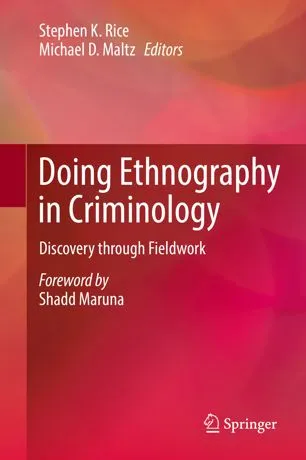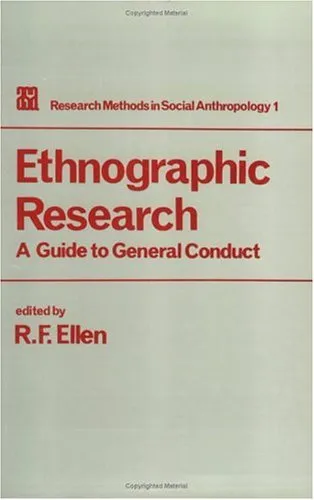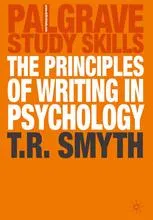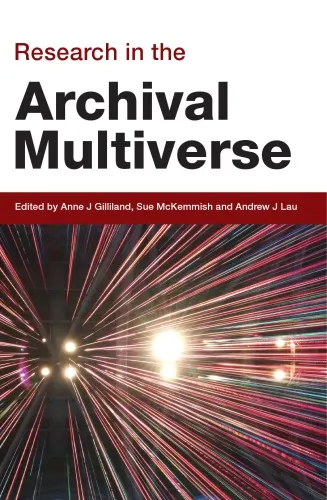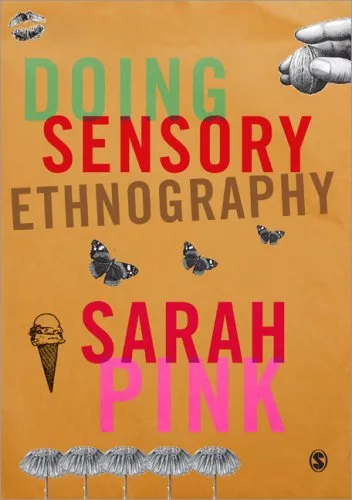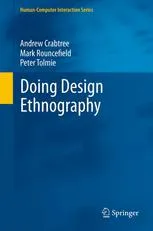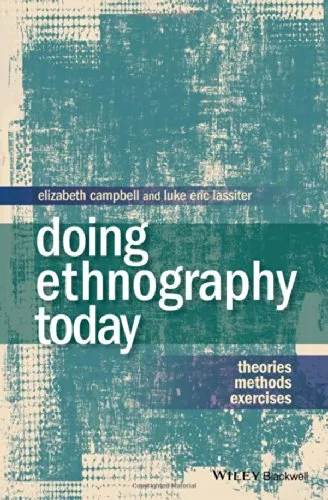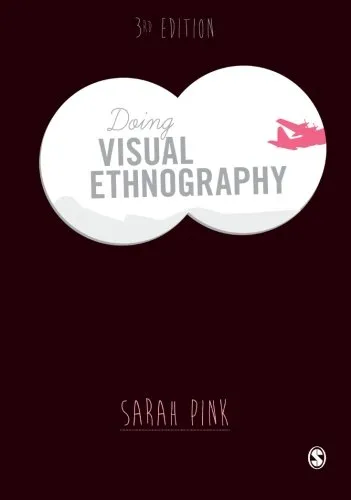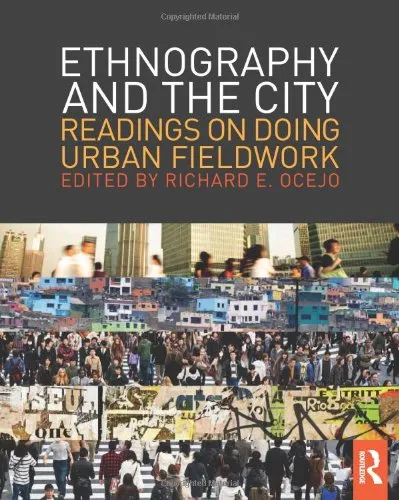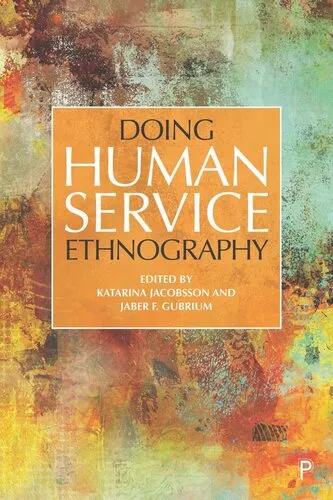Doing Ethnography in Criminology: Discovery through Fieldwork
4.5
بر اساس نظر کاربران

شما میتونید سوالاتتون در باره کتاب رو از هوش مصنوعیش بعد از ورود بپرسید
هر دانلود یا پرسش از هوش مصنوعی 2 امتیاز لازم دارد، برای بدست آوردن امتیاز رایگان، به صفحه ی راهنمای امتیازات سر بزنید و یک سری کار ارزشمند انجام بدینکتاب های مرتبط:
معرفی کتاب
کتاب Doing Ethnography in Criminology: Discovery through Fieldwork اثری منحصر به فرد از استفن کی. رایس و مایکل دی. مالتز است که در آن اصول و روشهای Ethnography در حوزه جرمشناسی بررسی شده است. این کتاب فرصتی بینظیر برای دانشجویان، پژوهشگران و علاقهمندان به جرمشناسی فراهم میکند تا از طریق Fieldwork به کشف و تحلیل مسائل پیچیده جرم و رفتارهای اجتماعی بپردازند.
خلاصه جامع کتاب
کتاب Doing Ethnography in Criminology اثری بینظیر است که اهداف، رویکردها و چالشهای استفاده از Ethnography را در بستر جرمشناسی مدرن روایت میکند. نویسندگان در این کتاب به تفصیل توضیح میدهند که چرا Ethnography به عنوان یک ابزار تحقیقاتی برای فهم تعاملات انسانی و مطالعه رفتارهای جنایی مؤثر است. علاوه بر این، بخشهای متعددی از کتاب به ارائه تکنیکهای خاص، مانند نحوه یادداشتبرداری در Fieldwork، روش تحلیل دادهها و درک عمیقتر از جوامع جنایی اختصاص یافته است.
در این کتاب، خواننده با مفاهیمی همچون "تحلیل کیفی"، "روشهای تطبیقی" و "دادهمحوری" آشنا میشود. نویسندگان با ارائه مطالعات موردی واقعی، تصویری معتبر از دنیای واقعی جرمها و مجرمان ارائه میکنند. این رویکرد به خوانندگان کمک میکند تا به درک عملی این روشها در شرایط مختلف دست یابند.
نکات کلیدی کتاب
- اهمیت استفاده از Ethnography در مطالعه مسائل جرمشناسی.
- چگونگی انجام Fieldwork با حفظ بیطرفی پژوهشی.
- راهکارهای تحلیل دادههای کیفی پیچیده و استخراج نتایج علمی معتبر.
- بررسی مطالعات واقعی برای درک عمیقتر از رابطه بین رفتارهای جنایی و بافت اجتماعی.
- بازنمایی چالشهای اخلاقی در طول Fieldwork و نکات ضروری برای مواجهه با آنها.
نقلقولهای معروف از کتاب
در بخشهای مختلف کتاب، نویسندگان تأکیدی عمیق بر اهمیت Fieldwork در کشف حقایق کمتر شناختهشده درباره جرم و بزهکاری دارند. در زیر برخی از جملات کلیدی کتاب آورده شده است:
“Ethnography is not merely a method; it is a lens through which we better understand the intertwining of criminal behaviors and societal structures.”
“Fieldwork reveals the human stories behind the statistics, allowing us to appreciate the complexities of both crime and justice.”
چرا این کتاب اهمیت دارد؟
کتاب Doing Ethnography in Criminology یکی از منابع کلیدی برای افرادی است که مایل به درک عمیقتر از مبانی و روشهای تحقیق در جرمشناسی هستند. اهمیت این کتاب در این است که روشهای عملی برای انجام پژوهشهای میدانی ارائه میدهد و به خوانندگان ابزارهایی برای کشف واقعیات پیچیده درباره جرم و جامعه میدهد. علاوه بر این، نویسندگان با تمرکز بر چالشهای عملی و اخلاقی، چارچوبی جامع برای پژوهشگران فراهم کردهاند که بتوانند به طور مؤثر با واقعیتهای دشوار مواجه شوند.
به این دلیل، این کتاب نه تنها برای دانشجویان و اساتید جرمشناسی ارزشمند است، بلکه برای همه کسانی که علاقهمند به درک عمیقتر از تعاملات انسانی، رفتارهای جنایی و تأثیرات اجتماعی آنها هستند، پیشنهاد میشود.
Introduction to "Doing Ethnography in Criminology: Discovery through Fieldwork"
Ethnography has long been a fundamental methodology in understanding human behavior, particularly in the field of criminology. Stephen K. Rice and Michael D. Maltz, through their thought-provoking book "Doing Ethnography in Criminology: Discovery through Fieldwork", immerse readers in the transformative power of qualitative research. Seamlessly blending theory with practice, the book underscores the necessity and relevance of ethnographic approaches in unveiling the intricate dynamics of crime, deviance, and justice. This introduction provides a detailed summary of the book, its key takeaways, famous quotes, and a reflection on its importance.
Detailed Summary of the Book
"Doing Ethnography in Criminology: Discovery through Fieldwork" serves as both an instructional guide and a reflective compendium of insights gleaned from conducting ethnographic research in criminology. The authors guide readers through the nuts and bolts of ethnographic fieldwork, offering a rich tapestry of real-world examples, challenges, and methodologies used to explore criminal behavior, community responses to crime, and the functioning of the justice system. At its core, the book asserts that ethnography is not merely a passive observation tool but an active process of engagement and discovery.
The authors emphasize the value of "being there"—of immersing oneself in the social worlds of the people being studied. They detail a broad range of ethnographic methods, from participant observation and in-depth interviews to shadowing criminal justice practitioners. Additionally, the book contextualizes the ethical dilemmas faced by fieldworkers, from negotiating access and gaining informed consent to maintaining confidentiality and navigating one's role as both an insider and outsider to the communities studied.
Each chapter weaves together theoretical concepts with practical examples, drawing from a host of case studies and field experiences. The authors also reflect on how ethnography uniquely captures the lived experiences and perspectives of marginalized populations—voices often absent from statistical or administrative data. By prioritizing human stories over abstracted figures, ethnographic criminology reveals the subtle, often hidden dynamics of crime and justice that would otherwise remain unnoticed.
Key Takeaways
- Ethnography requires active immersion in the studied environment, lending authenticity and depth to criminological research.
- Understanding crime and justice involves bridging the gap between theory and practice through direct interaction with individuals and communities.
- Ethical considerations are central to ethnographic methods, requiring careful negotiation of boundaries, roles, and responsibilities.
- The qualitative nature of ethnography enables researchers to capture nuances and unspoken truths absent from quantitative data.
- Fieldwork in criminology empowers researchers to challenge stereotypes, confront biases, and give voice to underrepresented groups.
Famous Quotes from the Book
-
"Ethnography is not so much about finding answers as it is about asking the right questions in the right way."
-
"Criminology cannot exist in a vacuum—ethnography reminds us to ground research in the lived realities of people and communities."
-
"The field is where theory blossoms, evolves, and is sometimes disproved."
Why This Book Matters
"Doing Ethnography in Criminology: Discovery through Fieldwork" occupies a unique space in criminological literature by championing the qualitative, human-centric approach to research. In a discipline often dominated by statistical analyses and large-scale surveys, the book reminds us of the irreplaceable value of understanding lived experiences. Crime and justice are deeply rooted in social contexts, and ethnography provides the means to decipher and articulate these complexities.
The book is essential reading not only for seasoned criminologists but also for students, policymakers, and anyone interested in the realities of crime and justice beyond the numbers. It offers a practical framework for budding ethnographers while functioning as a reflective companion for experienced researchers navigating the ethical and logistical challenges of the field.
Ultimately, by prioritizing empathy, curiosity, and ethical rigor, the book underscores the transformative potential of fieldwork—not just for the researcher, but for the communities they engage with. It is a call to action for criminology to remain connected to humanity, to ground its insights in real-life stories, and to challenge the boundaries of knowledge through immersive discovery.
دانلود رایگان مستقیم
شما میتونید سوالاتتون در باره کتاب رو از هوش مصنوعیش بعد از ورود بپرسید
دسترسی به کتابها از طریق پلتفرمهای قانونی و کتابخانههای عمومی نه تنها از حقوق نویسندگان و ناشران حمایت میکند، بلکه به پایداری فرهنگ کتابخوانی نیز کمک میرساند. پیش از دانلود، لحظهای به بررسی این گزینهها فکر کنید.
این کتاب رو در پلتفرم های دیگه ببینید
WorldCat به شما کمک میکنه تا کتاب ها رو در کتابخانه های سراسر دنیا پیدا کنید
امتیازها، نظرات تخصصی و صحبت ها درباره کتاب را در Goodreads ببینید
کتابهای کمیاب یا دست دوم را در AbeBooks پیدا کنید و بخرید
1239
بازدید4.5
امتیاز0
نظر98%
رضایتنظرات:
4.5
بر اساس 0 نظر کاربران
Questions & Answers
Ask questions about this book or help others by answering
No questions yet. Be the first to ask!
